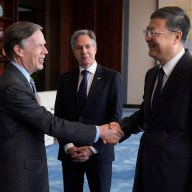SEOUL, South Korea – South Korea’s K-League will introduce promotion and relegation in the coming season as part of an overhaul prompted by last year’s match-fixing scandal and intended to make the league stronger than Japan’s J-League.
South Korean clubs have been by far the most successful in Asian competitions in recent years, but in terms of organization and professionalism, the league has fallen behind its neighbour.
The problems were exposed last year when more than 60 players and coaches, past and present, were indicted in a massive match-fixing scandal.
Officials at the K-League are trying to turn that problem into an opportunity for structural change. Relegation will take place in 2012 for the first time ever as the league enters its 30th season.
“It is time,” the K-League’s deputy general manager Kwon Sung-jin told Associated Press. “The match-fixing problem is a part of it but we want to take the league and the football system as a whole to the next level”
Of the 16 teams that start the coming season in March, two will be relegated to a newly organized second tier; the first time that the rule has been used in Korea.
One of the relegated teams will be Sangju Sangmu, after the Asian Football Confederation said the national army club — in which players can complete their two-year military service — should not be in the top tier.
Two more will be relegated the following season to reduce the top flight to 12 teams. Following that, there will be annual promotion and relegation between the two tiers.
The Asian Football Confederation had warned South Korea that the lack of relegation and promotion could result in a reduction in the country’s allocation of Asian Champions League places.
Still, the introduction of relegation had some Koreans worried, arguing that the nature of club ownership in the country — most teams are owned by a single major corporation — meant relegation could imperil club futures if corporations withdrew their support.
“In Japan, clubs aren’t owned by one massive corporation but often supported by a number of small sponsors,” said Yoon Jung-hwan, the Korean head coach of newly promoted J-League club Sagan Tosu.
“If fans love the club then they will follow it whatever happens and the same can be true of sponsors too. In Korea however, with many clubs backed by one company, the owners could lose interest if a club is relegated. That is a worry.”
In another reform, the K-League has adopted the Scottish model for the season: after all teams play each other home and away, teams from the top half and bottom half will form separate groups that will play each other twice again. The winner of the top group is the champion, and the bottom teams in the lower group will be relegated.
“There were two reasons to introduce the Scottish system which are the same as the reasons why Scotland did it,” said Kwon. “The first is the number of teams. By 2014, there will be 12. That is too few to have teams play each other just twice but if you do it four times, it is too many.
“Also, we wanted to promote interest in the league. Splitting the league two-thirds of the way through the season also keeps interest going until the very end. It means lots of exciting and meaningful games for both the title and to avoid relegation.”
The reduced number of meaningless late-season games should also make it more difficult for match-fixers. In addition, the introduction of a new K-League pension scheme for players and the abolition of the league cup — the scene of many match-fixing activities and unloved by fans — should also reduce corruption.
Authorities are hopeful the changes will help boost attendances, which have plateaued around the 12,000 mark for a number of years. Last September, a delegation from the league went on a research trip to Scotland, England, Netherlands and Germany and came back with one key message.
“The most important thing we learned is that it is all about the fans,” Kwon said. “If you have fans in the stadium then everything is fine. If there are no fans then the rest is not so important. Fans are everything.”
Yoon said there were also lessons to be learned from its chief football rival and neighbour Japan.
“Japan has set a target to win the World Cup by 2050 and all aspects of the game are preparing for that little by little,” Yoon said. “In the K-League there is no long-term vision and it is the same with many of the clubs.”
















